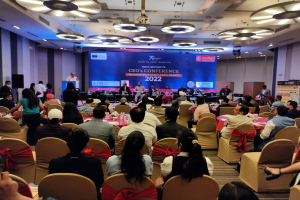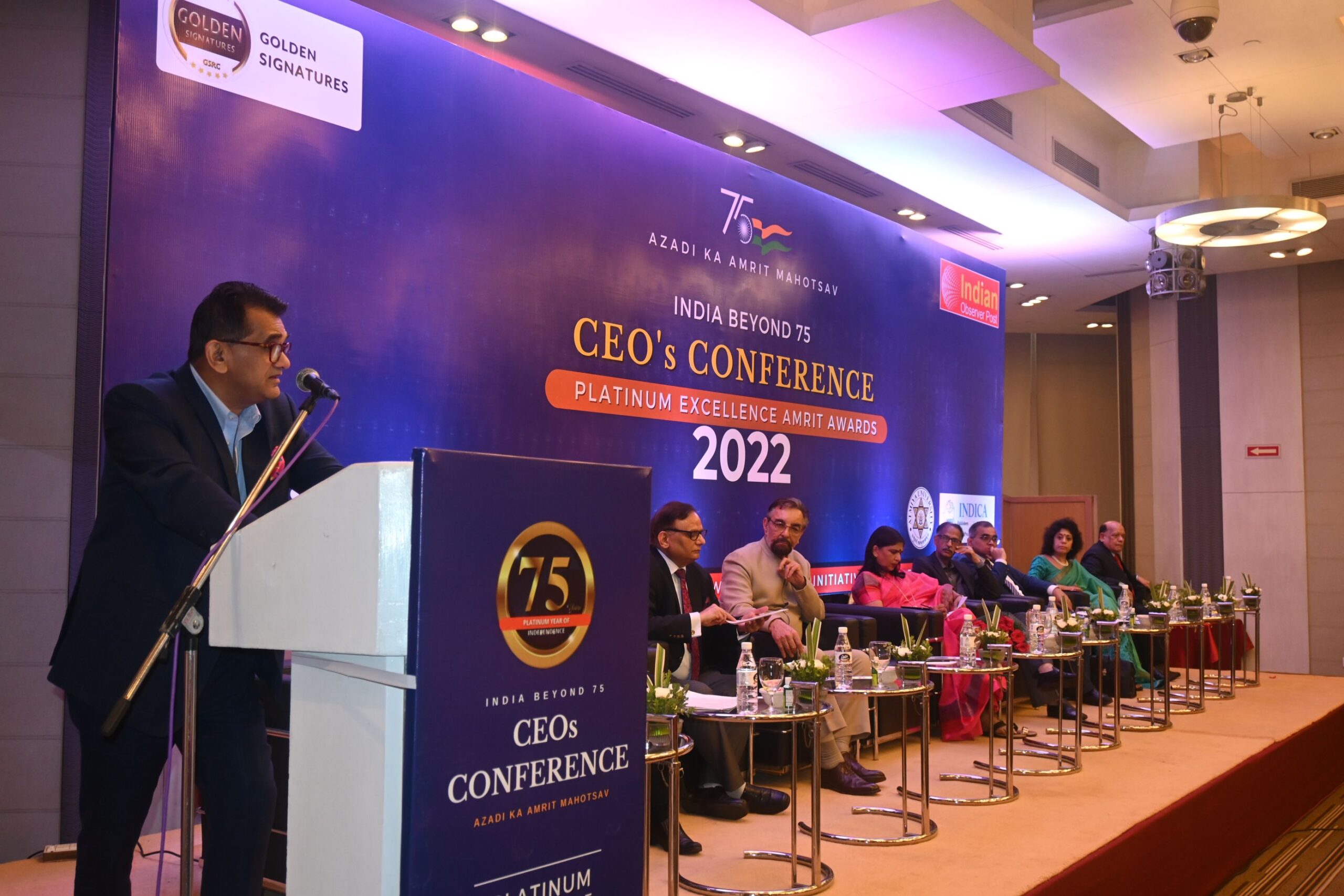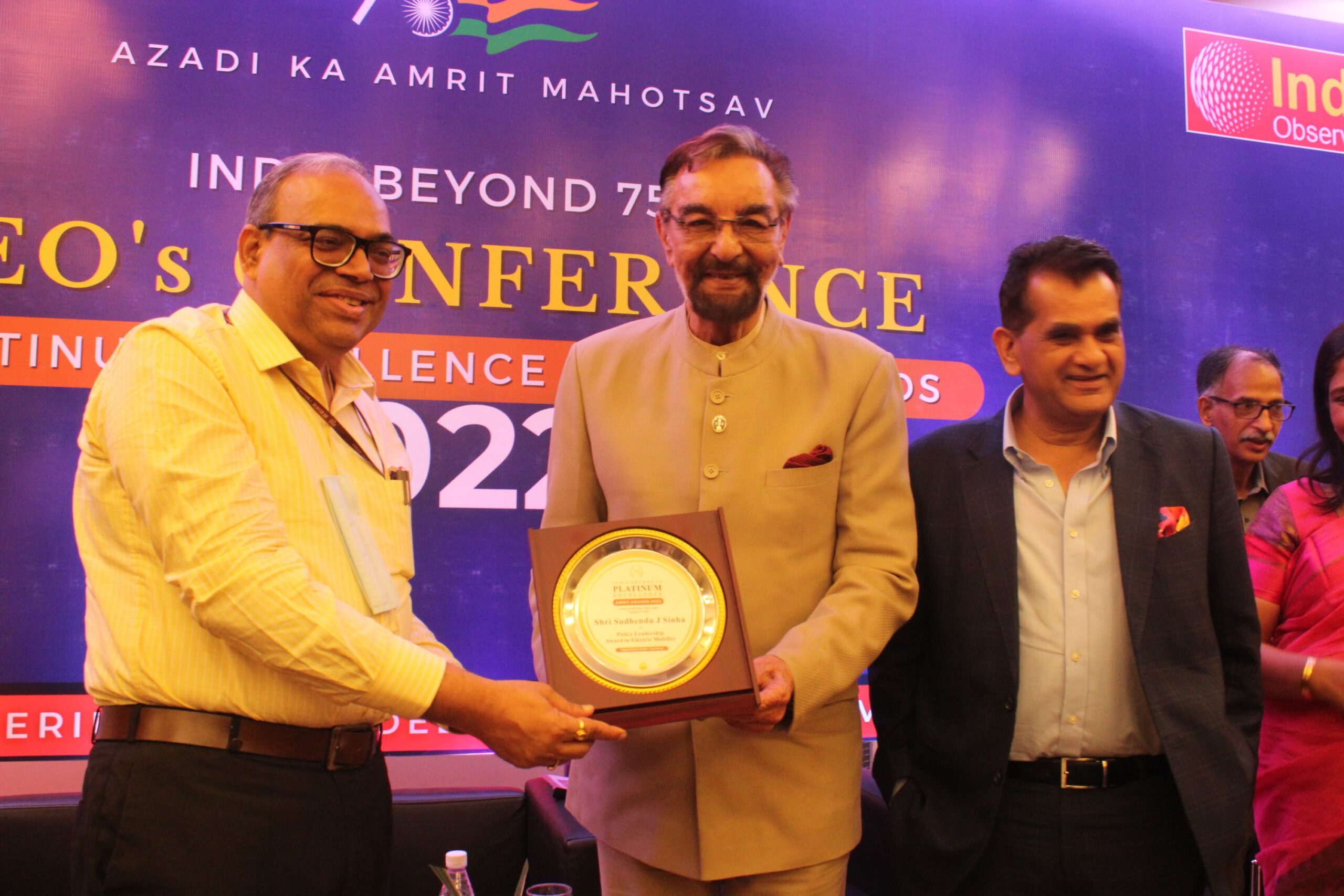
New Delhi: India needs to grow at about 9-10 per cent GDP rate for the next two and a half decades translating into higher per capita income for its people said Amitabh Kant, former CEO of NITI Aayog while delivering a keynote address at ‘India Beyond 75: CEO’s Conference’ here today.
Kant quoted country cases of China, Korea and Singapore on how these economies grew, bringing growth and prosperity to both their people and countries.
India’s per capita GDP right now in 2021 in constant terms is 3 trillion more than Korea’s. “But it is important to understand that India’s per capita GDP is close to 2000 dollars and in Korea, it is close to 40,000 dollars. It’s not total GDP but the per capita GDP which is very important,” he said.
If India grows at 6% by 2047, the per capita GDP of its citizens would go up from 6000 to 6100 dollars, but if it grows at 8%, it will be 12,622 dollars, and if it grows at 10% the per capita GDP will grow at 21000 dollars. “You will transform the life of your citizens by 21000. That is the compounding power of the growth – why Korea and China are able to transform the lives of their population because they grew at 8 to 10% of compounding power,” he said. He recalled that when India became independent, its per capita GDP was more than the per capita GDP of China and Korea but thereafter Korea’s GDP increased by 37X and in China, the growth was 18X while in India it was just 7X since 1947. “Now income in Korea is 5X that of India and China is 2x of India in present time of 2022,” he said.

Kant stressed that states in India would need to grow for driving the national growth pathways. “When the Prime Minister is talking about Azadi ka Amrit Mahotsav, he is talking about changing India in one generation – how to transform India in one generation? It’s very important to understand because several countries in the world have actually transformed themselves within one generation,” he said. Citing the example of Japan, he said from 1956 to 1973 Japan actually had an average growth rate of 9.6% and within that period of 56 to 73 totally transformed itself into a rich country and raised the living standards of its citizens above the boundary line. “If you look at Korea between 1960 to 1990, it again grew at 9.6% and if you look at China they were at the same level as us during 1988. But from 1995 to 2010 – in 15 years they grew at a scorching rate. It is important to understand that when you grow up at a high rate of 9.5 / 9.6 – 10% of compounding power of growth is very important and Singapore 1960 to 1992 grew at 8.6%,” he illustrated.
“While we are the fifth biggest country and we are heading towards the third largest economy in the world. Everybody has an individual biometric; everybody has a mobile to transact data. India has more digital financial transactions than both China and USA put together,” Kant said and added, “Everybody will say that there is good demography and a good young generation but what is important to understand by a new survey that has come up that says, India has very sharp decline in fertility rates and India’s population is now stabilizing and its population will not grow rapidly – so now fertility rate is falling. According to this latest survey, there are more women than men and it will be difficult for India to grow without the major focus on women and without increasing female labour participation.”
Giving a roadmap for India’s growth in the next 25 years, Kant said, “World-class global Infrastructure: Roads, Aviation are the key drivers of growth. So, the strategy should be to move towards urbanization and manufacturing-driven urbanization. The GDP of Mumbai is more than UP. The GDP of Mexico is more than the GDP of India. Tokyo and Osaka’s GDP is more than the GDP of India. So, sustainable and good urbanization creates good quality jobs and what’s important is that this government is talking about smart cities, sustainable urbanization and planning.”
Asserting that growth is not driven by the government but by organizations, he said making enterprises more competent was the key and therefore, the Government “has to be a facilitator”. According to him building infrastructure in a decarbonised way, weaning off heavy dependence on agriculture on the economy and leapfrogging technology will be critical enablers in India’s economic growth story, going forward. “India needs to be technologically competent. India needs to disrupt technological innovation – electronic mobility, mobile manufacturing etc.”, he stressed.
Referring to the upcoming G20 summit being hosted by India, Kant, who is the ‘Sherpa’ of G20, noted that the G20 members are the 20 most developed countries of the world, having 88 % of global GDP, 80% of global trade, 90 % of global patents, and 67% of the global population. He pointed out at probably the highest gathering in India of actually 40 to 42 countries including G20 and heads of Internation Monetary Fund, World Bank. “Therefore it’s a great opportunity to present both the hard and the soft power of India in front of the world,” he said.

Meanwhile, Kant also conferred India @75 Platinum Excellence Life Time Achievement Amrit Award2022 to renowned film actor Kabir Bedi for his contribution to performing arts internationally. The event was organized by the Golden Signatures Research & Consulting, to commemorate India’s completion of the 75th year (platinum year) of independence and to celebrate its 76th Independence Day.
– global bihari bureau





